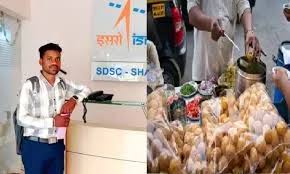In an era where stories of grit and transformation often emerge from the margins, few are as profound as that of Ramdas Hemraj Marbade, a young engineer who now works at India’s prestigious Vikram Sarabhai Space Centre (VSSC) under the Indian Space Research Organisation (ISRO). His path to the country’s elite space agency began not in elite coaching institutes or urban academic circles — but at a roadside pani puri stall in the dusty lanes of Beed district, Maharashtra.
The son of a modest street food vendor, Marbade spent much of his childhood helping his parents serve snacks to make ends meet. His education was punctuated by hardship: days that began with chores, followed by school, and ended with long nights at the stall. Books were often read under dim lights and borrowed lamps.
Yet, despite these constraints, Marbade never let go of a larger dream — a dream that defied his circumstances.
Educational Climb Against the Odds
Ramdas completed his schooling from Zilla Parishad School in Beed with distinction and earned a seat at the Government Polytechnic, Beed, for his diploma in mechanical engineering. Determined to pursue higher studies despite the economic strain, he went on to obtain a degree from the Government College of Engineering, Aurangabad, a feat made possible through a patchwork of scholarships, part-time jobs, and sheer resolve.
“I knew I didn’t have the luxury to fail,” Marbade recalled in an interview. “Every exam, every semester, was a step away from the life we were stuck in and a step toward dignity.”
Even while studying, he worked evenings and weekends at the family stall, selling pani puri and bhel puri. At times, he contemplated giving up, but was motivated by the silent sacrifices of his parents who never questioned his dream — only asked if he had eaten.
Entry into ISRO: A National Symbol of Aspiration
In 2023, after years of perseverance and academic achievement, Ramdas successfully cracked the recruitment process for a technical post at ISRO’s Vikram Sarabhai Space Centre in Thiruvananthapuram, where he now works in mechanical systems — an area crucial to the development of India’s satellite and launch vehicle technologies.
Marbade’s story stands as a powerful symbol of how access to education, even in its most fragile form, can elevate individuals from poverty to participation in nation-building. His transition from a roadside food vendor to an engineer at India’s premier space research agency speaks not only to his determination but to the transformative potential of public education and government technical institutions.
“His journey is a reminder that India’s talent is not confined to metros or coaching centres,” said a senior ISRO official. “It lies dormant in villages, waiting for a crack of opportunity.”
A Story Beyond Individual Triumph
While Marbade’s achievement has been celebrated across media and social platforms, educators and policymakers are also taking note. His rise highlights the urgent need to strengthen support systems for first-generation learners in rural India — from scholarships and mentorship to digital access and nutritional security.
He now serves as an informal mentor for several students from his village, regularly speaking to them about perseverance and the importance of long-term thinking. “I don’t want to be the exception,” he said. “I want others to believe that they can do it too — and do it better.”
In a nation where millions of children face systemic barriers to upward mobility, Ramdas Marbade’s journey offers more than just inspiration. It offers proof that with the right support, the next space scientist may well come from a street corner, a farm, or a footpath.


